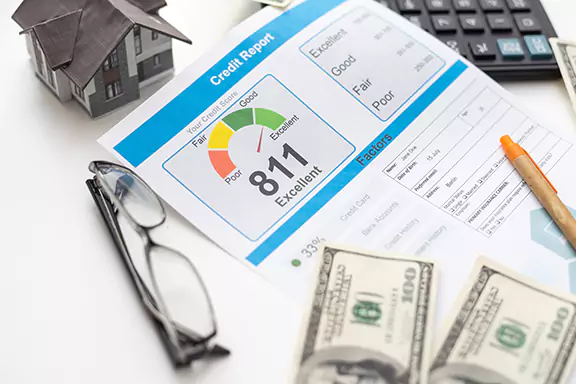Imagine that, after working hard and saving up, you have finally bought your first home. But just when you were ready to move in, you received a home insurance quotation from your provider that was much higher than expected.
How could this be possible?
After all, you and your partner have good jobs, have been paying your bills on time, and have been responsible homeowners so far. So why is the home insurance rate so high?
It turns out that your credit score plays a huge role in the rate you’re quoted. Home insurance companies use a credit-based insurance score to assess risk, which is why your poor credit score has resulted in a higher premium. The truth is that insurance companies often look at credit history when determining how much you’ll pay for homeowners insurance, and a bad credit score can result in higher rates.
But don’t panic—understanding how your credit score affects home insurance rates can help you take charge of the situation and potentially save you money in the future. In this article, we’ll dive into how credit score impacts your home insurance policy, and also give you some tips on improving your score to lower those premiums.
What is a Credit Score and How Does it Affect Your Home Insurance Rates?
A credit score is a number that reflects your credit history and how responsibly you manage your finances. It’s based on several factors, including your payment history, the amount of debt you owe, the length of your credit history, and the types of credit you use (called credit mix). The most commonly used credit score is the FICO score, which ranges from 300 to 850. Generally, the higher your score, the better your credit rating.
Here’s where things get interesting: home insurance companies use something called a credit-based insurance score to help determine how much you’ll pay for homeowners insurance. While your credit score is not the only factor insurers consider, it plays a significant role in calculating your premiums. Insurance companies believe that people with higher credit scores are less likely to file claims, which is why they offer them lower rates. Conversely, people with poor credit or a bad credit score are often considered higher-risk, which results in higher home insurance premiums.
How Does Your Credit Score Affect Home Insurance?
Your credit score directly impacts the home insurance coverage and coverage limits you receive. In many cases, if your credit score is low, you’ll be charged higher home insurance premiums. Insurers use your credit-based insurance score to assess the likelihood that you’ll file a claim and to determine the coverage limits for your policy.
Here’s how your credit score affects your homeowner’s insurance:
Good Credit: If you have a good credit score (typically 700 or higher), you’re more likely to get favorable home insurance rates. Insurers view you as a lower risk, which means you could qualify for lower premiums.
Bad Credit or Poor Credit: If you have bad credit or a poor credit score (typically below 600), you might face higher home insurance premiums. Insurers see you as a higher risk and will charge you more for homeowners insurance.
In some cases, a low credit score could even result in difficulty obtaining coverage at all, as some home insurance companies may refuse to offer you a policy due to the perceived risk.
How Much Can Your Credit Score Impact Home Insurance Rates?
The impact of your credit score on your homeowner’s insurance can be substantial. According to industry reports, people with a low credit score can pay up to 60% more for their home insurance premiums compared to those with good credit.
While every home insurance company has its own formula for calculating home insurance rates, studies show that insurers who use credit-based insurance scores may charge you significantly more for coverage if your credit rating is poor.
For example, if you have a credit score under 600, you could be quoted premiums that are much higher than if you had a FICO score above 700. The difference can add up to hundreds of dollars each year. The bottom line: a better credit score can lead to lower home insurance rates, while a poor credit score can result in higher rates.

How to Improve Your Credit Score and Lower Home Insurance Premiums
Now that you know how much your credit score affects your home insurance premiums, the good news is that you can improve your credit rating to potentially lower your rates. While credit scores don’t improve overnight, with some dedication and time, you can work to raise your credit score and improve your financial situation. Here are some tips to help you get started:
Review Your Credit Report for Errors
The first step to improving your credit score is to review your credit report for mistakes. Sometimes, inaccuracies or outdated information can lower your score. You can get a free credit report from the three major credit bureaus (Equifax, Experian, and TransUnion) once a year at AnnualCreditReport.com. If you spot any errors, dispute them to have them corrected. This could result in an immediate improvement to your credit score.
Pay Your Bills on Time
Your payment history accounts for a large portion of your credit score. Late payments, even if they’re just a few days overdue, can significantly impact your score. To improve your credit score, make it a priority to pay your bills on time. Set up automatic payments or use reminders to ensure you never miss a due date.
Reduce Your Debt
Your credit utilization ratio—the amount of credit you’re using compared to your total available credit—also plays a big role in your credit score. High credit card balances relative to your credit limits can hurt your credit score. To improve your credit score, try to pay down outstanding balances and aim to keep your credit utilization below 30%.
Don’t Open New Credit Accounts
When you apply for new credit, the credit bureaus perform a hard inquiry on your credit report, which can temporarily lower your credit score. If you’re working to improve your credit score, avoid opening new credit accounts unless necessary. Focus on managing your existing credit accounts responsibly.
Keep Old Accounts Open
The length of your credit history is another factor that impacts your credit score. The longer your credit history, the better it looks to insurance companies. So, keep older accounts open even if you’re not using them. Closing accounts can shorten your credit history and negatively affect your credit rating.
Diversify Your Credit Mix
Your credit mix, or the types of credit you have, also influences your credit score. If you only have credit cards, consider adding other types of credit, such as a small personal loan or a car loan. A diverse credit mix can help improve your credit rating over time.
Take Control of Your Home Insurance Rates
Now that you understand how your credit score affects your home insurance premiums, it’s time to take control of your rates. Start by checking your credit report for errors, paying your bills on time, and reducing your debt. Over time, improving your credit score can help you secure better homeowners insurance rates.
Be sure to shop around and get quotes from different home insurance companies to ensure you’re getting the best deal. Even with a poor credit score, some home insurance companies might offer better rates than others. It’s always worth comparing.
By focusing on improving your credit score and understanding how it impacts your home insurance policy, you can make more informed decisions that save you money in the long run.
Boost Your Savings: Start Working on Your Credit Score Today
Improving your credit score can take time, but the effort is worth it when you start seeing lower home insurance premiums. Don’t wait—take action now and see how a better credit rating can help reduce your insurance costs and improve your financial future. If you’re ready to start shopping for a more affordable homeowners insurance policy…
click >>> “Home Insurance Quotes Comparison: Finding the Best Deals Online“.

